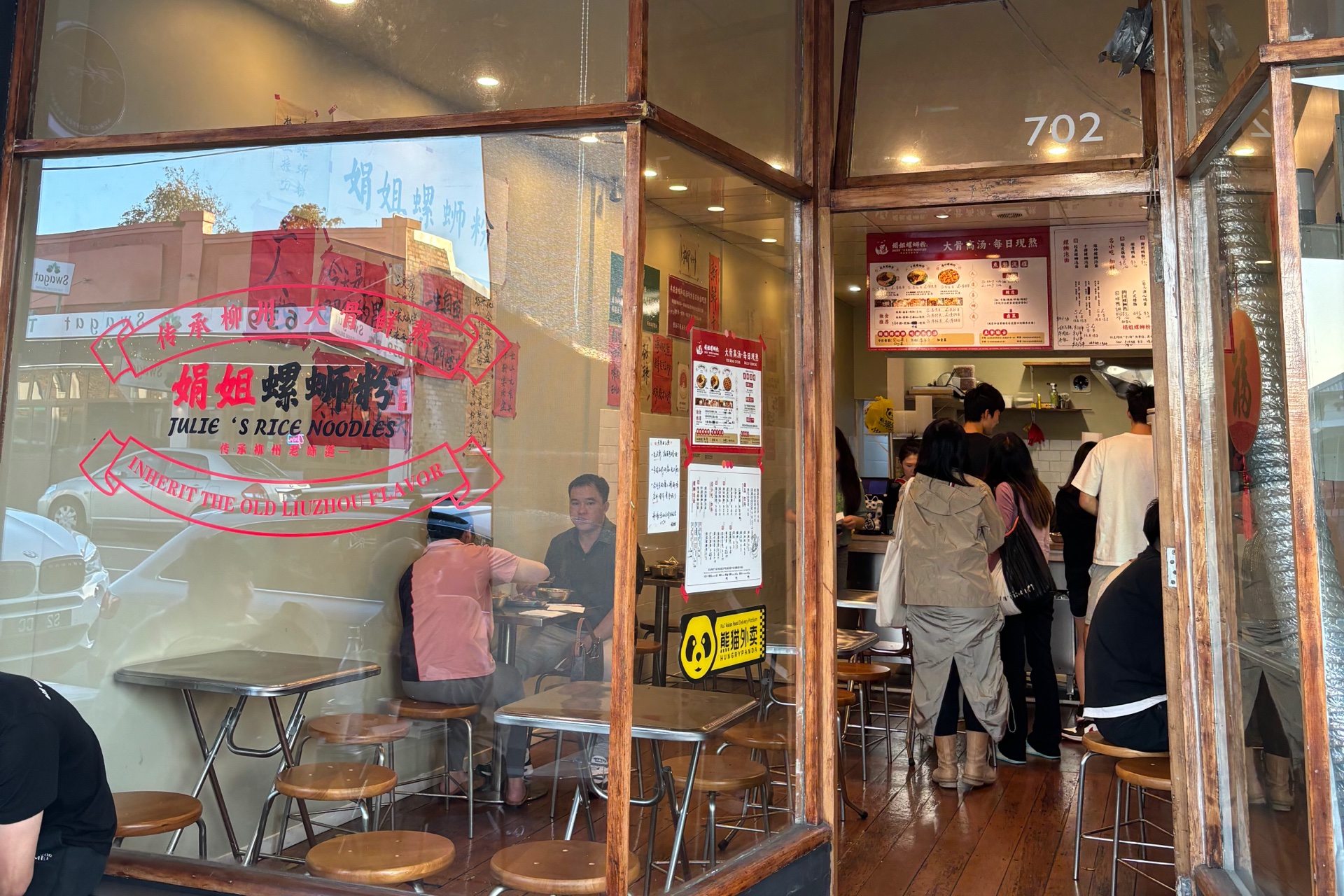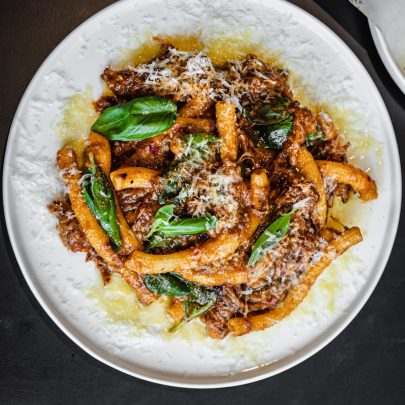Jul 16, 2024 Restaurants
It’s undeniable: this restaurant has a funk. Weaving through its cluster of silver metal tables on the Dominion Rd footpath, you will experience a waft of ferment, an unmistakable pickled bamboo shoot smell. That is the ‘soul’ of luosifen, or snail rice noodles; a pungency that has been compared to durian (funnily enough, a durian dessert shop, Le Musang, has just popped up across the road).
Julie’s Rice Noodles has been busy since it opened late last year, and the tables outside are usually full till closing, though I can’t say I’ve noticed it popping off among a non-Chinese crowd. That could be courtesy of the funk, of course, but perhaps also due to the intimidating lack of English and the fact that luosifen is, on the whole, not a very well known dish. It is the specialty of Liuzhou, Guangxi, in southern China, and served with a stock made out of river snails and pork bones. (If the snail thing sounds unappealing, don’t worry — you don’t see a single shell during the whole process.)
Julie’s is a tiny place, with a tiny menu. This makes it a little easier to order, especially if the volume of Chinese characters might otherwise confuse you. The main choice you have is between three types of luosifen: classic, dry or stir-fried. All three have a similar menagerie of ingredients that combine into a bright, pickley stew: bamboo shoots, black fungus, pickled green beans, fried peanuts. Then you choose your “pungency degree”, which means spice level. Oh, and then there’s a variety of smaller snacks you can get on the side, displayed in the bain-maries by the counter, which range from duck feet and blood to pigs’ trotters, tofu skewers and quail eggs.
From the back of the menu, you can also order “instant” luosifen. In China, the instant variety is extremely popular — a more elaborate version of the instant noodles you’re used to, with numerous packets of dehydrated vegetables and seasonings. If you order this option at Julie’s, they use dried instant noodles, but appear to do the toppings and broth themselves: you’re getting a similar dish to their main luosifen, just with the noodle type swapped out. I enjoy the idea that instant noodles have a value that transcends their cheap and basic reputation — the instant option here is just a different way of enjoying the dish rather than something inherently lesser (it’s not even cheaper on the menu!). We also grabbed a sour plum drink from the fridge (“shit, that’s sour”), which offered a refreshing punch to a palate already dealing with a pleasant hum of spice. (We ordered our luosifen at the medium ‘pungency degree’, and it had a noticeable kick.)
Everything at Julie’s is served up in metal bowls and platters — metal on metal — with the luosifen piled high with textured craggy fried bean curd skin. While everything was delicious, it was the rice noodles that impressed me most: not silky and disintegrating like so many other rice noodles are, but chewy, with a bitey bounce that made me wonder what else was in them.
What does the dish actually taste like? Nowhere near as funky as the funk suggests. The broth leans a bit seaweedy, light not heavy, savoury and tasty. Every time you go back for a hearty pull of the noodles with your chopsticks, you’ll be treated to something different: the crunch of bean sprouts, scraggly black fungus, minced meat. (You need to mix it well.) I found the stir-fried luosifen to be more ‘accessible’ than the classic or dry options — it had more of a wok hei, umami-ness that added another layer to the dish.
The sides come all together, seasoned to your nominated spice level. We got the braised pork skin — no-brainer morsels of fat — and some tofu skewers (“recommended” on the menu), which were puffy strips that absorbed the shallow pool of broth they sat in. We popped them in the middle of the table to share and picked at them in between bites of noodles, as everyone chowed down on their own luosifen.
When we arrived at Julie’s, nearly every table was taken; the three of us had to squeeze around one meant for two. The server was patient with our fumbling as we figured out how to order something new to us, and I appreciated their specificity of knowledge (as I often find when eating regional Chinese food in Auckland). The restaurant had a clear direction of purpose and understanding of what they’re about.
Previously when I’d walked past Julie’s, I’d noticed an array of Chinese words and characters handwritten on red paper covering the interior walls, so on this visit I brought along a friend who could read Chinese. I’d assumed that they were specials — the good stuff on the secret menu reserved only for those in the know. Turns out they were just decorative proverbs for Chinese New Year.
Julie’s Rice Noodles ***
702 Dominion Rd, Mt Eden
021 288 8648
Hours
Seven days, 11am–10pm
Dinner Bill
$16.80–$28.80 for noodles/noodles + side combos






